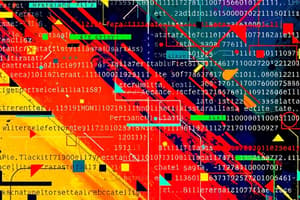Podcast
Questions and Answers
Which error occurs if a user enters a string when an integer is expected?
Which error occurs if a user enters a string when an integer is expected?
- Logic error
- Compilation error
- Syntax error
- Runtime error (correct)
What type of error is indicated by the compiler during the compilation phase?
What type of error is indicated by the compiler during the compilation phase?
- Syntax error (correct)
- Logic error
- Type error
- Runtime error
Which of the following best describes a logic error?
Which of the following best describes a logic error?
- The program runs but produces the wrong output (correct)
- The program does not compile
- The program crashes unexpectedly
- The program contains incorrect syntax
What is the primary challenge in debugging logic errors?
What is the primary challenge in debugging logic errors?
What should a program do to avoid runtime errors caused by input errors?
What should a program do to avoid runtime errors caused by input errors?
What is the process of finding and correcting errors in a program called?
What is the process of finding and correcting errors in a program called?
Which type of error might indicate a missing closing brace in code?
Which type of error might indicate a missing closing brace in code?
What typically describes an environment issue leading to a runtime error?
What typically describes an environment issue leading to a runtime error?
What is a checked exception in Java?
What is a checked exception in Java?
Which of the following examples is a checked exception?
Which of the following examples is a checked exception?
What happens if a checked exception is not handled in Java?
What happens if a checked exception is not handled in Java?
Which statement about unchecked exceptions is true?
Which statement about unchecked exceptions is true?
What is the role of the throw keyword in Java?
What is the role of the throw keyword in Java?
In Java, what would you use to handle an exception that may occur during file operations?
In Java, what would you use to handle an exception that may occur during file operations?
Which type of exception does NOT require explicit handling or declaration in Java?
Which type of exception does NOT require explicit handling or declaration in Java?
What is the purpose of the catch statement in Java?
What is the purpose of the catch statement in Java?
What is the primary purpose of using a debugger utility?
What is the primary purpose of using a debugger utility?
Which of the following is not a valid reason for an exception to occur?
Which of the following is not a valid reason for an exception to occur?
What does the Java Exception class generally represent?
What does the Java Exception class generally represent?
In Java, which block can be used to ensure that certain code is executed regardless of whether an exception is thrown?
In Java, which block can be used to ensure that certain code is executed regardless of whether an exception is thrown?
Which statement about Print Statement Debugging is true?
Which statement about Print Statement Debugging is true?
What are Java Errors categorized as?
What are Java Errors categorized as?
What is the main consequence of an uncaught exception in a Java program?
What is the main consequence of an uncaught exception in a Java program?
Which of these is a primary use of try and catch blocks in Java?
Which of these is a primary use of try and catch blocks in Java?
What does the finally statement achieve in exception handling?
What does the finally statement achieve in exception handling?
Which of the following statements about the ArithmeticException is true?
Which of the following statements about the ArithmeticException is true?
What information does a stack trace provide during debugging?
What information does a stack trace provide during debugging?
What is the primary purpose of the printStackTrace() method?
What is the primary purpose of the printStackTrace() method?
What is indicated by a stack frame in a stack trace?
What is indicated by a stack frame in a stack trace?
How can multiple catch blocks be utilized in exception handling?
How can multiple catch blocks be utilized in exception handling?
Which components can be found in a stack trace report generated during an exception?
Which components can be found in a stack trace report generated during an exception?
What happens if an exception occurs and is not caught in a try-catch block?
What happens if an exception occurs and is not caught in a try-catch block?
Flashcards
Syntax Errors
Syntax Errors
Errors that occur during compilation, often due to incorrect code syntax, missing punctuation, or unmatched braces.
Runtime Errors
Runtime Errors
Errors that occur during program execution, often caused by unexpected inputs or operations that the program cannot handle.
Logic Errors
Logic Errors
Errors that cause a program to behave incorrectly without causing it to crash. These errors often result from mistakes in the program's logic, such as incorrect calculations or missing conditions.
Debugging
Debugging
Signup and view all the flashcards
Input Errors
Input Errors
Signup and view all the flashcards
Data-Type Errors
Data-Type Errors
Signup and view all the flashcards
Input Validation
Input Validation
Signup and view all the flashcards
Input Prompt
Input Prompt
Signup and view all the flashcards
Exception
Exception
Signup and view all the flashcards
Print Statement Debugging
Print Statement Debugging
Signup and view all the flashcards
Java Error
Java Error
Signup and view all the flashcards
Exception Class
Exception Class
Signup and view all the flashcards
Catch Block
Catch Block
Signup and view all the flashcards
Finally Block
Finally Block
Signup and view all the flashcards
Try Block
Try Block
Signup and view all the flashcards
Try-Catch Blocks
Try-Catch Blocks
Signup and view all the flashcards
Multiple Catch Blocks
Multiple Catch Blocks
Signup and view all the flashcards
Stack Trace
Stack Trace
Signup and view all the flashcards
Runtime Exception
Runtime Exception
Signup and view all the flashcards
Arithmetic Exception
Arithmetic Exception
Signup and view all the flashcards
printStackTrace() Method
printStackTrace() Method
Signup and view all the flashcards
Stack Trace Generation
Stack Trace Generation
Signup and view all the flashcards
Checked Exceptions
Checked Exceptions
Signup and view all the flashcards
Unchecked Exceptions
Unchecked Exceptions
Signup and view all the flashcards
throw keyword
throw keyword
Signup and view all the flashcards
General Catch Block
General Catch Block
Signup and view all the flashcards
Handling Checked Exceptions
Handling Checked Exceptions
Signup and view all the flashcards
Handling Unchecked Exceptions
Handling Unchecked Exceptions
Signup and view all the flashcards
Study Notes
Week 4-5: Debugging Code and Analyzing Logic Errors
- This week covers debugging techniques for intermediate programming (CCPRGG2L)
- The course objective is to help students recognize errors in programs and create programs that handle errors and exceptions.
- Programming errors occur frequently, even for experienced programmers.
- Errors are categorized into syntax, runtime, and logic errors.
Programming Errors: Syntax Errors
- Syntax errors occur during compilation.
- They result from mistakes in code structure (e.g., typos in keywords, missing punctuation, incorrect brace placement).
- Compilers typically identify syntax errors, indicating their location and cause.
- Syntax errors are straightforward to find and fix.
Example of Syntax Errors
- Code example (
ShowSyntaxErrors.java) demonstrates a program with syntax errors leading to compilation failure. - The errors are directly highlighted in the source code.
Programming Errors: Runtime Errors
- Runtime errors happen during program execution, causing the program to terminate abruptly.
- They arise when the environment encounters impossible operations (e.g., division by zero, accessing invalid array indexes).
- Input errors are a frequent reason for runtime errors, such as incorrect input types (e.g., entering a string when a number is expected).
Preventing Runtime Errors
- Programs should prompt users to enter data of the correct type (e.g., "Please enter an integer").
- Implementing robust input validation prevents common runtime errors.
Programming Errors: Logic Errors
- Logic errors occur when a program does not run as intended.
- They can arise from various sources.
- A demonstration code example,
ShowLogicErrors.java, illustrates a program with a logic error that does not add numbers correctly.
Debugging
- Debugging is the process of finding and fixing logic errors (bugs).
- Common debugging strategies involve using print statements to track variable values or execution flow.
- For complex programs, dedicated debugging tools are often employed.
- Syntax and runtime errors are generally easier to identify than logic errors.
Java Exceptions
- An exception (or exceptional event) is a runtime problem that disrupts the normal flow of a Java program.
- Exceptions can be handled within try, catch, and finally blocks using Java coding structures.
- Various categories exist, prompting developers to adapt to each particular category to best tackle runtime errors.
Java Exception Categories: Java Errors
- These are not exceptions: they represent problems beyond the user's or programmer's control.
- Examples include stack overflow errors.
- Java errors are usually ignored during compilation.
Java Exception Categories: Java Checked Exceptions
- These exceptions are checked by the compiler.
- Programmers are obligated to handle these appropriately so errors do not interrupt programs.
IOExceptionis a common checked exception. It occurs in file reading and writing activities.
Java Exception Categories: Java Unchecked Exceptions
- These exceptions do not need explicit handling.
- They are known as runtime exceptions.
- Common unchecked exceptions include
ArithmeticException,NullPointerException,ArrayIndexOutOfBoundsException.
Exception Handling (try, catch, finally)
tryblocks encapsulate code potentially risking errors.catchblocks handle specific exception types.finallyblocks run regardless of success or failure within atryblock.
Multiple Catch Blocks
- A
tryblock can have multiplecatchblocks targeting different types of exceptions. - Exceptions caught within a specific
catchblock are not handled elsewhere in other potentialcatchblocks.
Evaluating Stack Traces
- Stack traces are generated when exceptions are thrown. They display method calls leading to the error.
- Stack traces show exactly where an exception occurred and steps that led to the error.
- Stack trace information aids debugging by locating the exact location of error in program execution.
Handling Exceptions Using Stack Traces
- The
printStackTrace()method displays the stack trace for an exception. - Stack trace analysis helps identify the cause of exceptions and fix associated errors.
Studying That Suits You
Use AI to generate personalized quizzes and flashcards to suit your learning preferences.
Related Documents
Description
This quiz focuses on debugging techniques essential for intermediate programming students, covering syntax, runtime, and logic errors. Students will learn to recognize and handle various programming errors effectively through practical examples. Enhance your ability to troubleshoot and rectify code issues!




